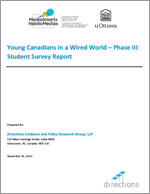Science
“A scientifically and technologically literate person is one who can read and understand common media reports about science and technology, critically evaluate the information presented, and confidently engage in discussions and decision-making activities that involve science and technology.” Science Co-ordinators’ and Consultants’ Association of Ontario (SCCAO) and Science Teachers’ Association of Ontario (STAO/APSO), Position Paper: The Nature of Science (2006)


 This report, written by Directions Evidence and Policy Research Group (Directions), details the results of a 2013 national survey of Canadian youth conducted by Directions on behalf of MediaSmarts. The classroom-based survey of 5,436 students in grades 4 through 11, in every province and territory, examined the role of networked technologies in young people’s lives.
This report, written by Directions Evidence and Policy Research Group (Directions), details the results of a 2013 national survey of Canadian youth conducted by Directions on behalf of MediaSmarts. The classroom-based survey of 5,436 students in grades 4 through 11, in every province and territory, examined the role of networked technologies in young people’s lives.